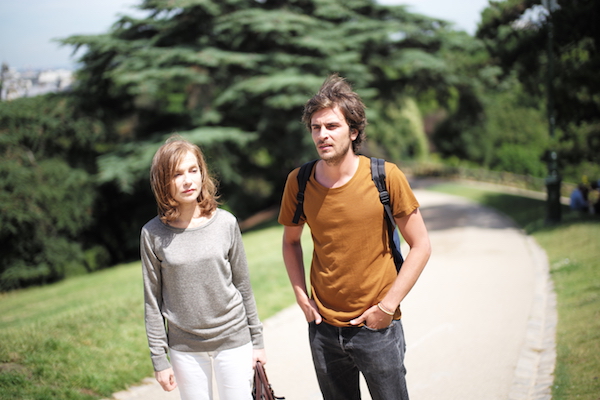
Isabelle Huppert and Roman Kolinka in Mia Hansen-Løve’s “Things to Come.” | L. BERGERY/ SUNDANCE SELECTS
BY STEVE ERICKSON | Thanks to the gods of timing, New Yorkers have the opportunity to see two of French actress Isabelle Huppert’s best performances simultaneously, in Paul Verhoeven’s “Elle” and Mia Hansen-Løve’s “Things To Come.”
Hansen-Løve has said, “I rate her as the greatest French actress.” I agree, except that I would take “French” out of that sentence. “Elle” subjects Huppert’s character Michele to extreme sexual violence only to celebrate her resilience and ability to survive a difficult life, even while suggesting she’s fundamentally a cold, unpleasant person.
“Things To Come” is much different. A brief episode of stalking by a creep, which starts at an Abbas Kiarostami film, is the closest it comes to the brutality of “Elle.” Hansen-Løve’s film is much more down-to-earth and naturalistic. While relatively plot-driven, it’s also content to observe a few years in Nathalie’s (Huppert) life. The emotional ups-and-downs are much closer to most women’s lives than those of “Elle,” but, in a more subtle way, they’re still painful.
Nathalie is a high school philosophy teacher in Paris. Devoted to her job, she says that she’s not out to start a revolution but to get her students thinking for themselves. She’s burdened by an elderly mother (Édith Scob) who constantly makes demands on her time, calling her at 5 a.m. in the midst of panic attacks. Nathalie spends a lot of time with a former student, Fabien (Roman Kolinka), who has become an anarchist writer. Then one day, her husband tells her that he’s leaving her for another woman, after 25 years of marriage. Her life has been turned upside down, but she explores the options still open to a single middle-aged woman.
Hansen-Løve constantly employs Steadicam tracking shots, particularly while following people walking. She likes to play around with sudden leaps from interior spaces to exteriors. There are a handful of images captured in dingy glass or mirrors. The colors tend to be bright, even when the lighting is dim.
In many ways, “Things To Come” is a thoroughly French film, starting with the fact that its protagonist is a philosophy teacher who recalls the radicalism of her youth. Beyond that, as she edits a book on philosophy, a friend is editing a series of essays on philosophers like Michel Foucault and Theodor Adorno for the high school students. The film’s relationship to radical politics is ambiguous and, perhaps, ambivalent. Hansen-Løve’s partner, Olivier Assayas, celebrated a chaotic early 1970s student revolt in “Cold Water” and returned to that period to give a much more detailed depiction of the radical left in “Something in the Air.”
Hansen-Løve, 35, is about 25 years younger than Assayas. May ’68 and the entire counterculture was over and done with before she was born. Yet she treats the era with a gentle respect, suggesting that becoming a communist was a healthy rite of passage for someone like Nathalie when she was young, even if Nathalie eventually realized the ideology’s flaws. She finds something ridiculous in contemporary manifestations of radical politics, such as a student strike that finds freshmen calling their teachers “scabs” as they debate whether they should be able to enter a building to teach.
A visit to an anarchist commune is more complicated for Nathalie. The film suggests that some of its ideas may be valid, but Nathalie has aged beyond the notion of searching for an “alternative lifestyle.” While the commune debates the politics of crediting individual authors, they don’t seem to be getting actual writing done. For her part, Nathalie is more interested in looking for her lost cat, Pandora, than discussing politics with them.
There aren’t really many films like “Things To Come.” Even in France, female protagonists in their 50s or early 60s are relatively rare. “Things To Come” plays like an Éric Rohmer re-boot of Paul Mazursky’s “An Unmarried Woman,” if one can imagine that. (Hansen-Løve cites Rohmer as an influence herself.) Many of Huppert’s best roles have involved testing the limits of female sexuality; in Michael Haneke’s “The Piano Teacher,” she sliced her vagina with a razor blade. “Elle” continues her work in that vein. “Things To Come” shows how equally good Huppert can be in a gentler context.
THINGS TO COME | Directed by Mia Hansen-Løve | Sundance Selects | In French with English subtitles | Opens Dec. 2 | IFC Center, 323 Sixth Ave. at W. Third St.; ifccenter.com | Lincoln Plaza cinema,1886 Broadway at W. 62nd St.; lincolnplazacinema.com



































